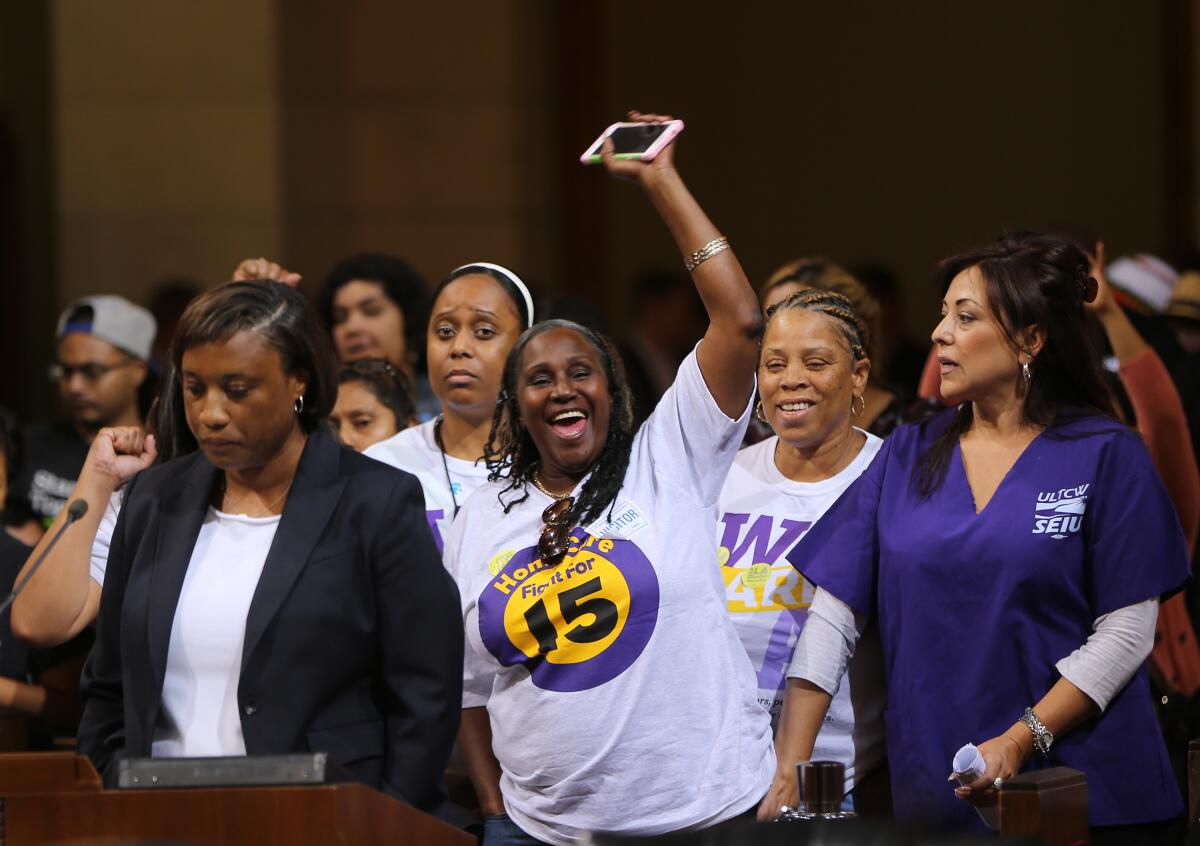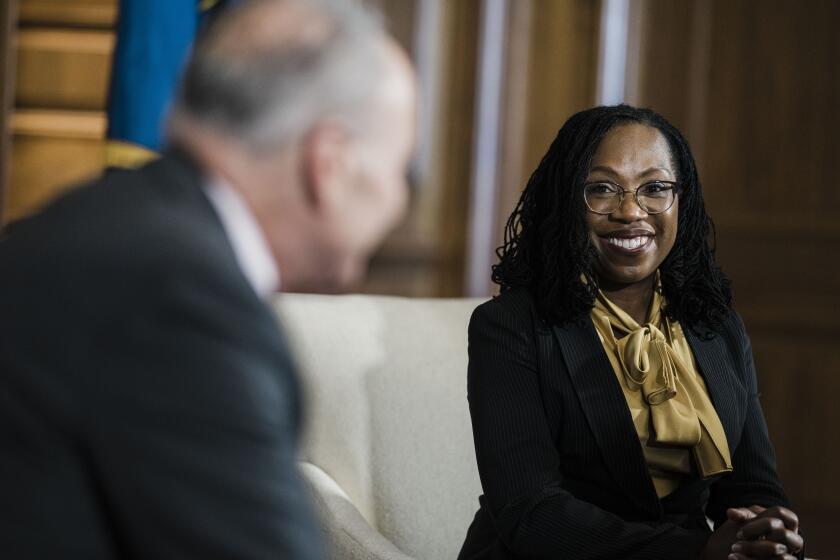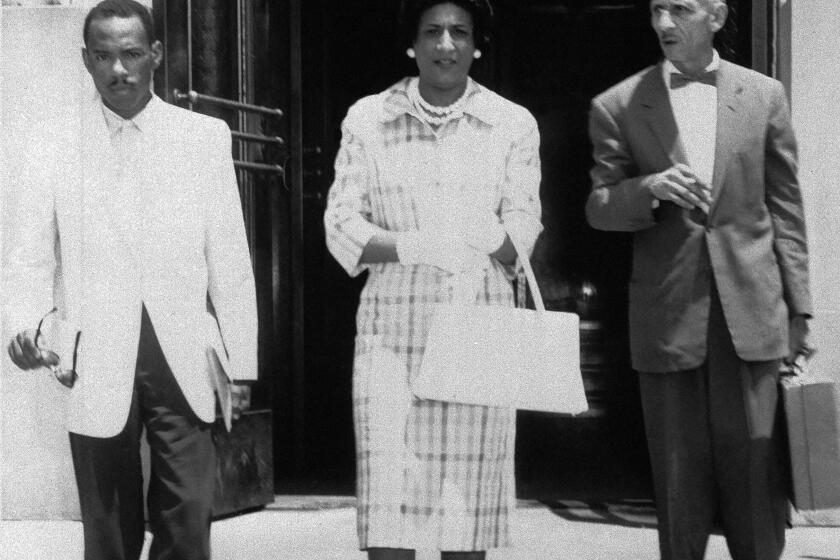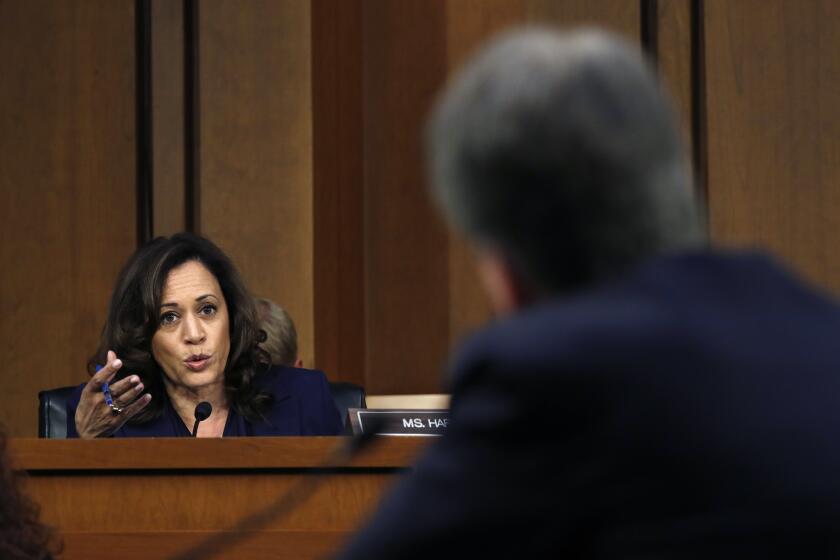Column: Democrats should be putting Black women like Laphonza Butler on the ballot

- Share via
Laphonza Butler, who was just named to represent California in the Senate, was elected president of the largest union in California when she was just 30, almost 15 years ago.
I know we’re supposed to focus on what she is, because Gov. Gavin Newsom pledged to have a Black woman fill the seat that was vacated when Sen. Dianne Feinstein died last week, but that doesn’t mean we can’t also talk about what she has done — and when.
Opinion Columnist
LZ Granderson
LZ Granderson writes about culture, politics, sports and navigating life in America.
Consider this: Through August, more than 300,000 laborers have gone on strike across the country, affecting a wide variety of industries. The writers have a new contract, but the actors are still picketing. Last week, the United Auto Workers strike in Michigan became the site of an unofficial 2024 campaign stop. In Chicago, there was even a 13-day cannabis industry work stoppage in the spring over unfair labor practices.
In this environment, Newsom sent the former president of the largest union in his state to the Senate. Feels like a statement.
Biden is siding with labor against capital. Trump is posing as a culture warrior to woo working-class white voters.
But because he had previously promised to send a Black woman to temporarily fill that role, her race and gender make the statement that’s getting the most attention.
Our culture had the same fixation when Ketanji Brown Jackson was nominated to be a Supreme Court justice, even though she received the highest ranking for qualification that the American Bar Assn. has to offer. President Biden was fulfilling, for a second time, a promise similar to Newsom’s — the first obviously being the selection of Kamala Harris as his running mate.
There’s only one reason people would call for the Supreme Court nominee’s LSAT scores.
As luck would have it, Butler worked on Harris’ 2020 presidential campaign and will be sworn into the Senate by her. It will be a beautiful moment for them.
It should be a reflective moment for the rest of us.
What these three incredible women of color have achieved in their careers is remarkable and should be celebrated.
Constance Baker Motley had a better resume than Sandra Day O’Connor. But when it comes to ‘qualified,’ only the opinions of the president and Senate count.
But can Democratic men now stop pledging to appoint Black women as though they’re a charity in need of matching contributions?
Black women have never needed an electoral quid pro quo — a “vote for me and I’ll appoint one” sort of thing. “Fighting Shirley” Chisholm went from the first Black woman elected into Congress in 1968 to running for president in 1972, winning 10% of the vote in the primary. This despite little money and a lot of hostility from her own party.
We can cut the song and dance, can’t we?
Given Biden’s age, Republicans will also run against Harris. What he does now to showcase her talents — yes, she has talents — could be the difference between a win and a loss.
There’s an establishment core to the Democratic Party that weaves together anti-Blackness and misogyny, which leads to a mind-set in which Black women are qualified enough to carry democracy yet somehow unqualified to earn their place in the nation’s highest offices.
Qualifications were never the primary barrier for Black women in Congress or any other station in politics, were they? We could celebrate the fact that there’s a Black woman in the Senate or bemoan the fact that the only one had to be appointed rather than elected. We could celebrate that California’s governor kept his promise or bemoan the fact no Black woman has ever been elected governor here or in any other state.
Instead of pledging to appoint Black women, the national party and Democratic leaders should be pledging to get more elected.
Shortly after Butler was named president of the political action committee Emily’s List in 2021, she shared a story with Politico about how her then-7-year-old daughter influenced her to take the job. (Butler became the first mother to lead the organization in its nearly 40-year history.)
Apparently her daughter was upset because her class held a mock election in which different animals made different campaign promises. The winner was a wolf. Butler’s daughter was the only student to vote for the turtle.
“He wanted to be fair to everybody,” said Butler of the turtle’s platform. “And he wanted everybody to have what they needed.”
The wolf promised everyone candy.
Hey, that’s the game, right? Say what voters want to hear.
The cynic in me wonders how many more times Democrats can promise to appoint Black women before it all becomes white noise. Because let’s get real: The party could seriously back Black female candidates and make history across the nation. Or white male candidates could keep talking about “making history” while they dangle pledges about Black women.
It feels as manipulative as promising candy to schoolkids. We don’t want to hear it. We want to see these qualified women on the ballot, getting the party support that they need to win and wield their power.
More to Read
A cure for the common opinion
Get thought-provoking perspectives with our weekly newsletter.
You may occasionally receive promotional content from the Los Angeles Times.














